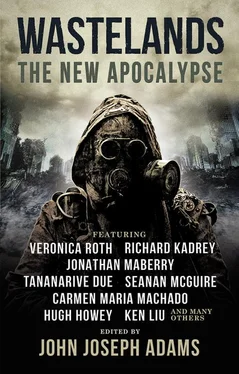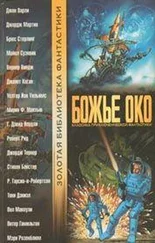* * *
He wandered for a few weeks after that, interacting with as many of the city’s fading wonders as he could, but found fewer that worked and even fewer that he had not seen.
When he had decided that, he fell into revisiting some of the places where he had already been.
He went to the nursery, found Forever—who was already gathering a new layer of dust—held him for a little bit, and said some things about connections that fail and times that end, that Forever must have understood not at all.
He went to the library, gazed upon all the shelves lined with unreadable books, and stood for a while in the presence of all those unknowable narratives, and contemplated a life spent curled up with them, the life he would have been happy enough to undertake were it possible to cross the obstructions between those words and his eyes.
He revisited the murdered man, who told him again that things were ending and that there was no time to lose, if he wanted to live.
He went back to the Cinema to see where the story had gone, and found that it had indeed progressed since his last visit. The image on screen was no longer a man punching a wall, but was now a different man, one who looked very much like Kayn himself, sitting cross-legged in a desert very much like the one currently engulfing the city. The man was alive and aware and clearly capable of action; it was possible to tell, just from the way he blinked at the moments when one errant breeze or another deposited grains of sand in his eyes. But he did nothing to shield himself, nothing to rescue himself from the forces that would soon enough bury him. He was spent. And in the fourth hour that Kayn spent absorbed in this absence of all adventure, the star of the movie shifted, turned his dusty visage toward the audience, and focused on Kayn alone, ignoring the handful of others who had been sitting for far longer, waiting for him to do something worth seeing.
He said, “Go.”
Kayn said, “Where?”
“I don’t care, Adam Splendor Sadness Feline Igneous Ultimate Never Cul-De-Sac Untoward Synchronicity Leverage Cystic Beverage Arrogance Wholly Thirteen Cunnilingus Hummingbird Multiplication Kayn. This show is over for you. Go elsewhere.”
Kayn, who had never been the type to stay where he wasn’t wanted, went.
He retraced all his steps, lingering here and there and taking weeks for the journey, until he found himself back in the room of his greatest humiliation, looking up at what was left of his old orgynism, and found that it had deteriorated horribly in his absence. No longer an approximate sphere, it was now a crescent moon, disfigured by a great gaping crater where fully a third of the participants had either been pushed out, or had left of their own accord. Of those who remained, only about half were still in motion, attempting to make up with their efforts what the immobile remainder no longer could. Their union no longer looked like bliss, but like desperation, denial of that which was coming for all of them. One of those still grinding away, but not looking at all well, opened his eyes and noticed Kayn. He said, “I suppose you came to gloat.”
“No,” said Kayn. “I did not.”
“Liar! I know the way it works! You want us to say that it all fell to pieces when you left! Well, it did, but you had nothing to do with it! It was an inevitability, a shift in our corporeal paradigm, that was only the next natural step in the evolution of our union! Soon, we will re-incorporate under new principles and achieve heights we never would have known were we still with you, slaves to your antiquated erotic philosophy! We would not have you back even if you begged us, do you hear? Not one of us, not all of us! We are better without you and we will continue to be, until the end of the world!”
“That’s no more than two days away,” said Kayn, whose connection to the city’s flailing machinery was still keeping him informed.
“Two days is forever,” the dying man told him.
Kayn considered it and thought that yes, this was true. There had been no subjective time in the orgynism. Hours had been the same as centuries, and centuries the same as hours. That it lasted as long as it had was therefore the same thing as not lasting for a heartbeat, a crowning achievement the same thing as a total failure. This truism, it further struck him, was also true of the city itself, and, to a still larger extent, the history of all humanity, a race that had been around for many billions of years and had turned out to be as ephemeral as a sneeze. He thought: How many terribly depressing things are also tremendously freeing? and embraced that epiphany, feeling much better.
“Enjoy your two days,” he told the man functioning as the voice of the orgynism.
“Go to hell.”
* * *
In the past, when great ships sank far from land, those left aboard in the final moments had to choose between two options. One was to stay aboard the vessel for as long as they could, and in so doing embrace what life-preserving properties it still had, at the cost of submitting themselves to the prospect of being dragged with it down into blackness. The other was to damn the dubious comforts of that which would not float for long, dive into the turbulent sea, and swim like mad, knowing that there was no other vessel to swim to, but still embracing fate, challenging the universe to provide deliverance while it still could. There had always been advocates of both methods, people who had lived and died by both methods, people who had doomed themselves by making the wrong choice. The right choice had never been anything but circumstance.
Aware of this, and aware that his own preferred strategy would soon be moot, Kayn trekked through streets that were coming apart even as he traveled on them, to the spot he had chosen for his own egress. His strategy was, as it turned out, not a unique one; there were a dozen others, comprising the largest crowd he had seen in one place since departing his orgynism, in line ahead of him, waiting for their own leap into stormy waters. He watched one or two of them go, and then sat cross-legged on the floor, to do the one thing he’d never really done before, the one that he did not think he would have another chance to do after today.
In short, he composed a poem.
He did not ask the machines to compose a sonnet for him. The last time he’d done that, it had turned out to be the worst sonnet ever written. He had no comprehension of that literary form in particular or of the rules of meter or rhyme, and so his wasn’t even a sonnet. It was in truth only a poem at all because that was what he had intended to write and because now, at the end of time, it would have been downright silly for even the most persnickety critic in all the world to make a fuss about definitions. Besides, honestly, it was more than fair to say that Kayn had accomplished the goal sought by all the poets who had written in all of Mankind’s languages, since the beginning of time: for their words to last until the end of time. Though Kayn managed this trick by composing his just a few minutes before that grand departure, his seizure of this ancient goal could not be denied. His words, as heartfelt as any that had ever been written, would last to the dying of the light.
He struggled with the most important part, the lines that summarized everything he’d ever learned.
When nothing matters, everything matters .
When everything matters, everything’s tragedy .
When everything’s tragedy, everything’s comedy .
When everything’s comedy, nothing matters .
He was sufficiently proud of this to show it to the man standing ahead of him in line, who wore a stained black suit and a matching top hat, all gone ragged and stinking from many years without laundering. That man read the lines, seemed to consider delivering the judgment that it was incomprehensible gibberish, but lit up at that one highlight, saying, “Oh, very good. Very, very good. That summarizes the idiocy of the species more than anything.”
Читать дальше


![Nick Cracknell - The Quiet Apocalypse [= Island Zero]](/books/28041/nick-cracknell-the-quiet-apocalypse-island-zero-thumb.webp)









